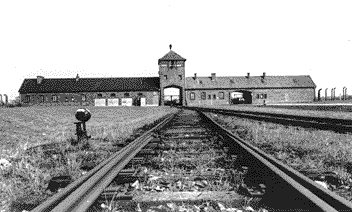|
Sometimes,
Tova
Friedman
meets someone who believes the Holocaust
never happened.
That's when she
shows them her tattoo on her arm, "A27633," a mark she
was branded with as a 5-year-old girl at Auschwitz. Four
million perished at the German concentration
camp.
"They told me I
no longer had a name," said Friedman,
who told her experiences as a Holocaust survivor to
honors and political science students Friday at Grand
Valley State University.
"Some people
told me I should have got rid of the tattoo," she said.
"I respond by saying that it was nothing I did. The world
should be ashamed, not me.
"Sometimes you
are going to meet people who say the Holocaust didn't
happen," she told the students. "That's why it's so
important for me to talk. Most of them didn't make it. By
telling you my story, I also tell you their stories. I
just don't want them to be forgotten."
Friedman
is director of Jewish Family Services in Highland Park,
N.J. She was in West Michigan this week taking part in a
PBS documentary on the Holocaust by GVSU station Channel
35. It will air in about 18 months.
Her experiences
were published in the book "Kinderlager: An Oral History
of Young Holocaust Survivors." Holland resident Milton
Nieuwsma wrote the book in 1998 and attended her
lecture.
"Her life is
such an inspiration," Nieuwsma said. "The courage that
she and her mother exhibited is amazing. The message
Tova conveys today is one of tolerance."
Although 64, she
dates her birthday to Jan. 27, 1945, the day the Russian
army liberated her from Auschwitz.
Students
listened intently as she described how she was
transported to Auschwitz for three days in a cattle car
by train without food, water or any privacy for people to
relieve themselves. She and her mother were separated
from her father on the way to Auschwitz. She told how all
the prisoners were stripped and had to walk naked by the
Nazis to see if they were healthy.
"Some people
didn't pass inspection," she said. "They were shot or
taken to the crematorium. We smelled the smoke and the
burning flesh."
All the inmates
had all their body hair shaved off. She had long
braids.
"Hunger was
unbearable," she said. "All I thought about was food. I
forgot about my mother and father. I forgot I belonged to
anybody."
Afterward,
several students said they were both horrified by the
atrocities and inspired by Friedman's
courage.
"It was very
heart-wrenching, but very inspirational at the same
time," said Brett Billedeau, 20.
"I think it's
amazing she portrayed it so well," said Jeri McGhee, 21.
"It's inspirational to us that something so tragic can be
expressed and not held back. She wants everyone to know
about it."
Shortly before
liberation, Friedman
and a group of other children were taken to the
crematorium to be put to death.
"I wasn't
worried," she said. "I thought because you were born
Jewish, it was some sort of crime. We're Jewish and we
have to die. That's just the way it is."
The children
were given orange towels to wrap themselves in after they
were told to remove their clothes.
"I remember
standing and utterly freezing standing in the towel," she
said.
Then after some
confusion, the soldiers returned the children to camp.
She doesn't know if there was a malfunction in the
equipment or if they weren't the proper group to be
executed that day. The Germans kept meticulous records
and did everything according to orders.
"I consider it a
complete and utter miracle," she said. "The miracle is I
came back."
|
